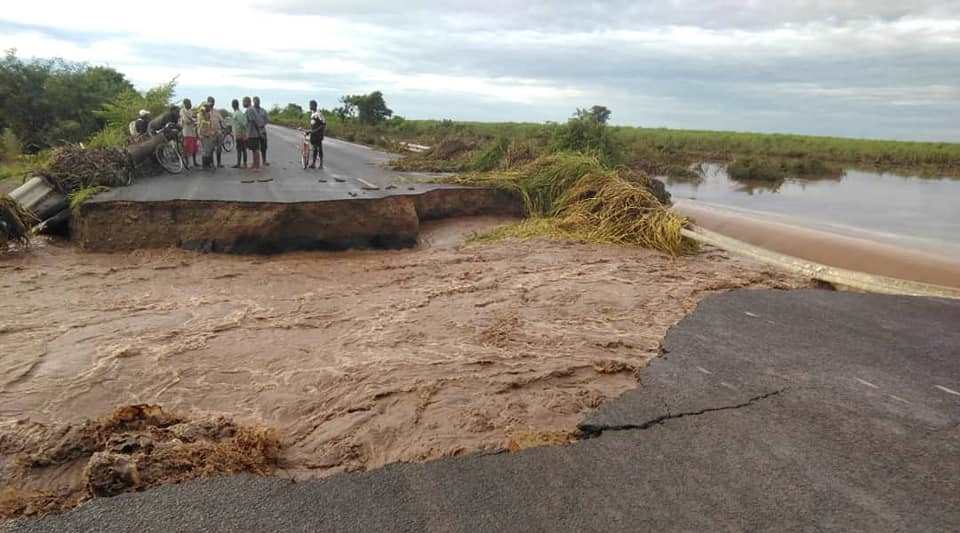Road damage makes disaster response costly
Heartbreaking sights of people carrying a coffin and emergency supplies across a road section highlight the new struggle to move people and goods on roads severely devastated by last week’s floods, mostly in the Shire Valley.
People displaced by harsh effects of Tropical Storm Ana face untold misery as massive destruction of the M1 and other roads makes delivery of relief supplies slow and costly.

For a week since stormy torrents battered the Southern Region, trucks carrying emergency supplies cannot go beyond Domasi near Kamuzu Bridge, where the country’s largest road lies in bits and pieces.
Day and night , humanitarian workers out to assist thousands in the Shire Valley pay a huge price for casual workers to carry the vital supplies across the shattered road.
In an interview, Malawi Red Cross Society (MRCS) spokesperson Felix Washon said the road destruction has made relief efforts hard and costly.
He said: “The road cut-offs have slowed assessments to understand the number of people affected, those in need of urgent assistance and their immediate needs.
“For us, it has made it difficult to deliver relief supplies beyond the point where the road has been severely destroyed. Our truck carrying tents, mats, bednets, shelter kits and blankets has been stuck in Blantyre for four days.”
On Friday, MRCS and the Department of Disaster Management Affairs (Dodma) engaged volunteers and casual workers to carry relief supplies beyond the shattered section.
The pieceworkers charged up to K100 000 to carry bags and bales across the devastated kilometre.
The extra costs pile across a 30 kilometre section of the M1 which has been cut six times, impinging access to southern parts of Chikwawa and Nsanje.
The distribution of emergency supplies has become more costly than earlier budgeted, said Washoni.
“The extra costs are eating hard into our budget.
Instead of buying more relief items, we have to hire two or three trucks to cross the broken road,” he explained.
Chikwawa alone plays home to over 400 camps of displaced people in dire need of foodstuffs, shelter and othe relief items.
District Commissioner Ali Phiri said communities beyond the shattered spots endure untold misery.
“This has greatly affected the distribution of relief items and some helpers may end up shunning the hard-to-reach communities in dire need,” he said.
According to Dodma, the storm has affected 845 685 people from 187 930 households in 17 districts, where 32 have been reported dead and 147 injured. Some 20 are reported missing persons, with 19 of them in Chikwawa and one in Mwanza.
Charles Kalemba, commissioner for Dodma, said inaccessible survivors stand to be the main losers as humanitarian agencies pay more to take relief items beyond the halt.
However, he said Dodma has started delivering vital supplies to flooded areas formerly reached by boats and helicopters.
Kalemba said: “As water is receding, we used the newly constructed Thyolo-Thekerani- Muona Road to deliver relief items to Fatima and Makhanga in Nsanje, where the Shire River meets the Ruo.
“We have also supplied evacuation centre camps from Ngabu in Chikwawa to Nsanje because we prepositioned relief supplies in our warehouse in Bangula.”
He said it was illogical that Dodma previously stockpiled emergency supplies in Ntcheu and Lilongwe.
“The disruption would have been bigger had we not established other warehouses at Bangula, Karonga and Mzuzu. The warehouse in Bangula was handy and it hasn’t been depleted,” Kalemba explained.
The United Nations interim country representative Rudolf Schwenk expressed solidarity with the government and victims of Tropical Storm Ana in almost 20 districts.
He told The Nation: “The current floods are a reminder that the climate crisis is very much a reality and vulnerable people are the most impacted by climate-related severe weather events.
“This requires going beyond disaster risk reduction to increase investment in community-led and sustainable resilience and response systems.”
The UN bills Nsanje, Phalombe, Mulanje, Chiradzulu and Chikwawa the most affected districts.





